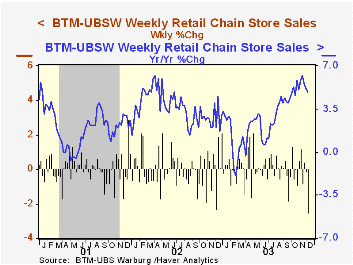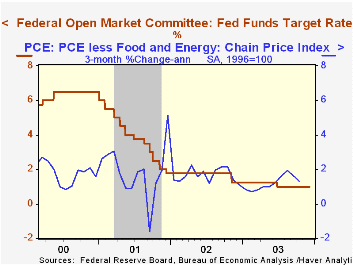 Global| Dec 09 2003
Global| Dec 09 2003Chain Store Sales Buried by Snow
by:Tom Moeller
|in:Economy in Brief
Summary
Chain store sales slumped 2.5% last week as two snowstorms blanketed the Northeast region of the US, according to the BTM-UBSW survey. The decline followed a 0.1% dip in sales during Thanksgiving week. Sales during all of November [...]

Chain store sales slumped 2.5% last week as two snowstorms blanketed the Northeast region of the US, according to the BTM-UBSW survey. The decline followed a 0.1% dip in sales during Thanksgiving week.
Sales during all of November rose 0.5% versus the prior month. That followed a 0.6% m/m decline in October.
During the last five years there has been a 61% correlation between the year-to-year percent change in the BTM-UBSW measure of chain store sales and the change in non-auto retail sales less gasoline.
The BTM-UBSW retail chain-store sales index is constructed using the same-store sales reported by 78 stores of seven retailers: Dayton Hudson, Federated, Kmart, May, J.C. Penney, Sears and Wal-Mart.
Analysis from the Federal Reserve Bank of New York exploring what chain store sales indicate about consumer spending can be found here.
| BTM-UBSW (SA, 1977=100) | 12/06/03 | 11/29/03 | Y/Y | 2002 | 2001 | 2000 |
|---|---|---|---|---|---|---|
| Total Weekly Retail Chain Store Sales | 412.2 | 422.8 | 4.9% | 3.6% | 2.1% | 3.4% |
by Tom Moeller December 9, 2003

As expected, the Federal Reserve left the target rate for federal funds unchanged at 1.00%. The discount rate also was left unchanged at 2.00%.
The decision was unanimous.
The press release which accompanied the Fed’s action contained the following statement. "The evidence accumulated over the intermeeting period confirms that output is expanding briskly, and the labor market appears to be improving modestly."
Surprisingly, the press release also indicated that "... with inflation quite low and resource use slack, the Committee believes that policy accommodation can be maintained for a considerable period." Most economists had expected the latter phrase would be omitted.
The complete text of the Fed's latest press release can be found here.
The stock market's reaction to Federal Reserve policy is explored by the Federal Reserve Bank of New York here.
Tom Moeller
AuthorMore in Author Profile »Prior to joining Haver Analytics in 2000, Mr. Moeller worked as the Economist at Chancellor Capital Management from 1985 to 1999. There, he developed comprehensive economic forecasts and interpreted economic data for equity and fixed income portfolio managers. Also at Chancellor, Mr. Moeller worked as an equity analyst and was responsible for researching and rating companies in the economically sensitive automobile and housing industries for investment in Chancellor’s equity portfolio. Prior to joining Chancellor, Mr. Moeller was an Economist at Citibank from 1979 to 1984. He also analyzed pricing behavior in the metals industry for the Council on Wage and Price Stability in Washington, D.C. In 1999, Mr. Moeller received the award for most accurate forecast from the Forecasters' Club of New York. From 1990 to 1992 he was President of the New York Association for Business Economists. Mr. Moeller earned an M.B.A. in Finance from Fordham University, where he graduated in 1987. He holds a Bachelor of Arts in Economics from George Washington University.






